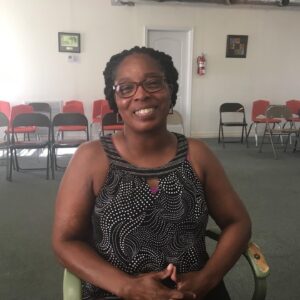Building Local Political Voice & Power
Primary author: Pam Brown

I have ideas that can reflect the town of State Line and what needs to be here in order for this to be a productive place.
Tanya N. Taylor, pictured left, interview #6-1-07
What is in this tool?
This tool is to help you think about how you can make your local formal political process easier to understand for everyone in town. It may give you some ideas for how to facilitate your community members building their voice through self-made action.
In speaking with my community I have come to the realization they also feel like they have no voice in local, county, or state governments. When I asked in my community some of the following questions I found out that many residents didn’t know how to contact county and state elected officials.
Understanding political systems is key to influencing them. Being able to have a say in the direction of shared decision making (like what tax money is spent on, or whether a dollar store can move into main street) is important for community-level self-determination. Having a voice also plays a strong role in individual self-determination, and how locals experience life in their town. Feeling pushed around, not knowing who to go to with a complaint, and never being asked your opinion can make people feel isolated and insecure. Short and long term community groups can arise to fill gaps not being addressed by a local municipality (for example, beautifying main street), or to address a shared concern (for example, windmills being installed too close to their neighborhood). Libraries often play an infrastructural role in supporting groups–without advocating for a specific political position–including providing space, filling informational needs, or providing a copier. Because libraries tend to be aware of which groups exist, they also help connect individuals to groups that might be of interest to them.
“They have become complacent.”
In the quotes below you will see that we have seen wherein the rural communities we researched, our communities feel like the “powers that be” whether it be local government or state government no longer care or listen to communities about their concerns or needs. The fears of some in our communities for speaking out is greater than the need to be heard.
How do the libraries fit in you may ask?
In this tool, I will give you some ideas and steps in which I think might be useful to reach your communities and help them feel like they have a voice.
Further Resources
Want to read about a small town trying to build their political voice? See the Stateline, Mississippi case study COMING SOON.
What to learn more about ways to give people more agency over their lives? Try the tools, Pathways to Belonging: To Be Seen & Feel Known and Is Everyone Welcome at Your Library.
